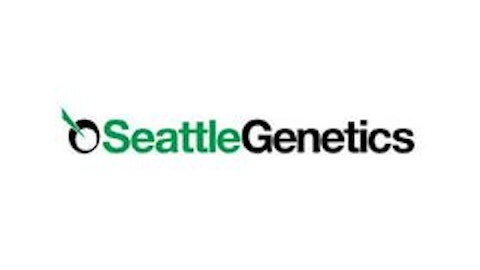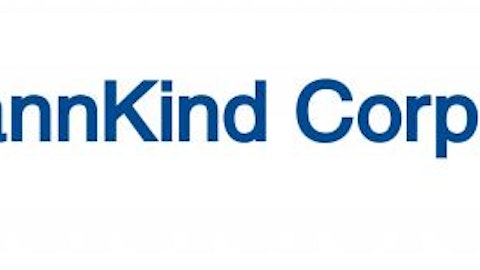A new drug in the fight against cancer is certainly an exciting and welcome development. Unfortunately, in many cases, the news often pushes the stock price of the company involved to overly enthusiastic heights. While the optimism about the drug may be fully justified, some investor caution on the stock may be prudent.
Recent news about Bristol Myers Squibb Co. (NYSE:BMY)‘s latest oncology drug candidate might be such a case. The company recently announced encouraging Phase I testing data on the drug nivolumab, which helps the immune system attack cancerous cells by restricting a cell protein called PD-1. The excitement surrounding the positive result helped push the stock up from around $40 to near $50 in a month. While the benefits of the drug are certainly encouraging, there are good reasons investors might want to be careful with the shares.
Beware the expectations
Shareholders have been hurt in many cases where expectations for a new pharmaceutical discovery meaningfully exceeded the eventual reality. One of the most recent and striking examples was with Dendreon Corporation (NASDAQ:DNDN).
This company received FDA approval for its lead product Provenge, an immunotherapy for prostate cancer, in April of 2010. The drug treats prostate cancer by stimulating the body’s own immune system to attack malignant cells. News of the drug’s approval drove the shares more than 30% on that day and pushed the stock from around $5 to over $50 per share over time. Analysts quickly became enamored with the company and estimated the $93,000 treatment would generate sales that could easily top $1 billion a year and could go as high as $2 billion.
Unfortunately, results fell far short of those expectations. Dendreon Corporation (NASDAQ:DNDN) reported full year sales of $214 million in 2011 and $325 million in 2012. In its latest quarter, sales dropped to a disappointing $68 million from $82 million in the comparable 2012 period. The company said that competitive pressure from a new Johnson & Johnson (NYSE:JNJ) drug called Zytiga, conveniently priced at $82,000 per treatment, was a major reason for the shortfall. The company’s future is uncertain and the stock price recently traded around $4.
Beware the competition
Excessive enthusiasm often blinds investors to potential competition, which can greatly reduce even a highly effective drug’s economic potential. Bristol Myers Squibb Co. (NYSE:BMY)’s nivolumab looks to face a couple of strong rivals. Drug giant Merck & Co., Inc. (NYSE:MRK) also has an experimental drug that targets PD-1. The drug, called lambrolizumab or MK-3475, showed essentially the same result as Bristol’s in a recent study and is thought to potentially have fewer side effects.
European pharma-company Roche is also a competitor. A leader in oncology with the blockbuster drug Avastin, it is working on an immune system booster called MPDL320A. The compound targets a protein called PD-L1, which the company believes may be more selective and safer than the PD-1 inhibitors of Bristol Myers Squibb Co. (NYSE:BMY) and Merck & Co., Inc. (NYSE:MRK). The thought is that the PD-1 drugs may impact not only the intended target, but possibly other healthy cells, which could cause lung inflammation and other serious side effects not seen with the Roche product.
Beware Bristol’s numbers
Bristol Myers Squibb Co. (NYSE:BMY)’s recent financial results might also indicate that caution could be warranted. Based on the numbers, the company’s shares look priced for assuredly much better times.
In the latest quarter, Bristol posted net sales of $3.9 billion, a decrease of 27% compared to the same period a year ago. The U.S. patent expiration of top seller Plavix in May 2012 led American net sales to decrease 44% to $2 billion, though international sales increased 6% to $1.9 billion. Bristol’s net earnings came in at $609 million, or $0.37 per share, in the quarter compared to $1.1 billion, or $0.64 per share, a year ago. Adjusted net earnings were $679 million, or $0.41 per share, compared to $1.1 billion, or $0.64 per share, for the same period in 2012.
The loss of Plavix patent protection was a serious blow to the company but other meaningful patent losses over the next couple of years look very likely. Expirations are expected for a drug called Baraclude in 2013 and for Abilify and Sustiva in 2015. These drugs together generate around $5.1 billion of revenue a year, about 30% of the current sales run rate.
Given the state of the company, Bristol Myers Squibb Co. (NYSE:BMY) shares look a bit expensive. Based on a generous assumption of annual sales around $18 billion with cash earnings of $3.88 billion, the company is valued at a robust 19x multiple using a cash earnings times a capitalization multiple valuation. Using 2013 company guidance of roughly $16.4 billion in revenue and cash earnings of $2.46 billion, the shares trade at a very aggressive 30x multiple.
In comparison, competitor Merck looks to trade at a confident but less ambitious level. It reported worldwide sales of $10.7 billion for the first quarter of 2013, a decrease of 9% compared with the prior year. Pharmaceutical sales declined 12% to $8.9 billion, though revenue from emerging markets grew 6% with China providing much of the growth with sales increasing 23%.
Merck expects full-year 2013 adjusted earnings to be between $3.45 and $3.55 a share, which equates to revenue around $46 billion and cash earnings of roughly $8.84 billion. Based on these figures, the company currently trades near a 16x multiple.
Conclusion
The results from Bristol Myers Squibb Co. (NYSE:BMY)’s new oncology drug look extremely promising. But that promise and more may already be priced into the stock. Hopefully, a large number of patients will be able to benefit from the company’s discovery. But investors might want to be a bit cautious with the stock. By not paying too much, they might also derive a reward from owning the company’s shares.
Bob Chandler has a short position in Bristol-Myers Squibb. The Motley Fool owns shares of Dendreon. Bob is a member of The Motley Fool Blog Network — entries represent the personal opinion of the blogger and are not formally edited.
The article Beware the Bullishness on Bristol-Myers originally appeared on Fool.com and is written by Bob Chandler.
Copyright © 1995 – 2013 The Motley Fool, LLC. All rights reserved. The Motley Fool has a disclosure policy.






